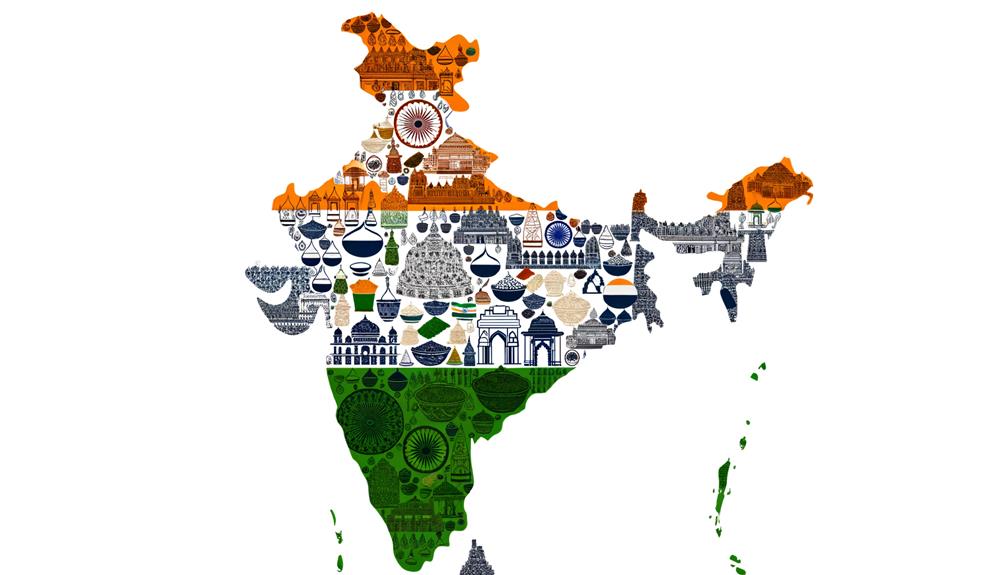India Name Meaning in English
The name 'India' is rooted in the ancient Sanskrit word 'Sindhu', which referred to the Indus River. This term was adopted by Persian invaders who pronounced it as 'Hindu'.
Greek adaptations transformed it into 'Indos', which was later Latinized to 'India'. These linguistic evolutions highlight significant historical and cultural interactions, particularly during Greek and Roman times.
The name was institutionalized during British colonial rule, giving it its modern form. The journey of the name 'India' encapsulates a rich tapestry of historical narratives and cultural exchanges, hinting at a deeper exploration of its profound legacy.

Key Takeaways
- The name 'India' originates from the ancient River Indus, known as 'Sindhu' in Sanskrit.
- Persian invaders pronounced 'Sindhu' as 'Hindu,' which evolved to 'India' through Greek and Latin adaptations.
- The Greek term 'Indos' and Latin term 'India' popularized the name in Western cultures.
- 'India' reflects historical ties to the Indus civilization, known for advanced urban planning and communication.
- The name symbolizes India's rich cultural, spiritual, and philosophical traditions.
Etymology of 'India'
Tracing the etymology of 'India' reveals its roots in the ancient river Indus, known as 'Sindhu' in Sanskrit, which was a significant geographical landmark in early historical records.
The name 'Sindhu' was utilized in ancient Indian texts to denote the vast river system and the surrounding region.
When Persian invaders arrived, they pronounced 'Sindhu' as 'Hindu,' which later evolved to 'Hindustan,' referring to the land beyond the Indus.
The Greeks, influenced by Persian terminology, called the region 'Indos,' and subsequently, the Latin term 'India' was derived.
This linguistic evolution highlights the influence of cultural interactions and geographical factors in shaping the name 'India,' encapsulating a rich tapestry of historical and philological developments.
Ancient Civilizations and the Indus
The ancient Indus Valley Civilization, flourishing around 3300 to 1300 BCE, represents one of the earliest and most advanced urban cultures in the Indian subcontinent. This civilization, centered around the Indus River, developed sophisticated city planning, advanced drainage systems, and standardized weights and measures.
The Indus script, although undeciphered, indicates a complex system of communication and administration. The term 'India' originates from the river's name, known in Sanskrit as 'Sindhu.' The ancient Persians referred to the region as 'Hindus,' derived from 'Sindhu,' which eventually evolved into the term 'India' through Greek and Latin adaptations.
Understanding the Indus Valley Civilization is essential in tracing the etymological roots and cultural heritage encapsulated in the name 'India.'
Greek Influence on the Name
Greek interactions with the Indian subcontinent, particularly during the conquests of Alexander the Great, played a significant role in the evolution of the term 'India.'
The Greeks encountered the mighty Indus River, which they referred to as 'Indos.' This nomenclature was derived from the Old Persian word 'Hinduš,' signifying the land beyond the Indus. The linguistic shift from 'Hinduš' to 'Indos' exemplifies the influence of Greek phonetic adaptation.
The term 'India' was thus popularized in Hellenistic texts and maps, cementing its place in the Western lexicon. This Greek influence not only broadened the geographic understanding of the region but also embedded 'India' as a term that would be carried forward through subsequent cultural and linguistic evolutions.
Evolution Through Latin
The term 'India' underwent significant transformation through Latin linguistic channels, where it was adapted from the Greek 'Indos.' This evolution highlights the broader historical linguistic influence of the Roman Empire on place names and cultural terminology.
Understanding the Latin etymological roots of 'India' underscores the intricate layers of historical and linguistic interplay that have shaped its current form.
Latin Etymological Roots
Tracing back to its Latin etymological roots, the name 'India' derives from the Latin term 'India,' which itself was adapted from the Greek word 'Indos' referring to the Indus River. This nomenclature evolved as ancient Greeks and Romans sought to describe the lands east of the Indus River, a significant geographical marker.
Key points to keep in mind:
- Greek Influence: The Greek term 'Indos' was used to describe the region around the Indus River, which was an essential part of the Persian Empire.
- Roman Adaptation: Romans adopted 'India' from the Greeks, incorporating it into Latin lexicon as they expanded their knowledge of geography.
- Cultural Transmission: This linguistic evolution mirrors the cultural and commercial exchanges between ancient civilizations.
Historical Linguistic Influence
Throughout history, the name 'India' underwent significant linguistic transformations as it was assimilated into Latin, reflecting broader intercultural exchanges and the evolving understanding of geography in antiquity.
The Greek term 'Indos,' derived from the Sanskrit 'Sindhu,' meaning river or sea, was adapted by the Romans into 'India.' This evolution underscores the transmission of knowledge through trade and exploration.
Latin chroniclers, such as Pliny the Elder, employed 'India' to describe the region beyond the Indus River, thereby solidifying its geographical significance. The Latin usage of 'India' not only illustrates linguistic adaptation but also highlights the cultural and historical interconnectivity of the ancient world, shaping the term's enduring legacy in modern English.
Historical Significance
India's name, believed to be derived from the River Indus, holds significant historical weight as it traces back to ancient civilizations and early linguistic developments. The term 'India' is rooted in the Sanskrit word 'Sindhu,' which referred to the Indus River. This name underwent several linguistic transformations over centuries, influenced by various cultures and languages.
Ancient Greek Influence: The Greeks, who encountered the Indus River, referred to it as 'Indos,' which evolved into 'India' in Latin.
Persian Contributions: Persian explorers pronounced 'Sindhu' as 'Hindu,' contributing to the region's identity.
Colonial Era: During British colonial rule, the name 'India' became widely institutionalized and internationally recognized.
Understanding these historical layers provides insight into India's enduring legacy.
Cultural Connotations
The cultural connotations of the name 'India' are deeply intertwined with its historical significance and symbolic interpretations. Historically, the name has been associated with a land of immense wealth and profound philosophical traditions, influencing perceptions globally.
Symbolically, 'India' evokes notions of spiritual richness, diversity, and a timeless legacy that continues to shape its cultural identity.
Historical Significance
Rooted deeply in ancient texts and traditions, the name 'India' carries profound cultural and historical connotations that reflect the region's rich heritage.
The etymology of 'India' comes from the Sanskrit word 'Sindhu', referring to the Indus River, an essential artery of early civilization. Historically, the name evolved through various linguistic influences, including:
- Persian Influence: Persian explorers adapted 'Sindhu' to 'Hindu', denoting the land beyond the Indus River.
- Greek Adaptation: The Greeks transformed 'Hindu' into 'Indos', from which the Latin 'India' was derived.
- Colonial Context: European colonialism perpetuated 'India' as the official nomenclature, embedding it in global consciousness.
These historical layers underscore the name's enduring significance, reflecting millennia of cultural and geopolitical evolution.
Symbolic Interpretations
Beyond its historical roots, the name 'India' evokes a tapestry of cultural connotations that symbolize diversity, spirituality, and resilience.
Linguistically, 'India' derives from the Sanskrit 'Sindhu,' referring to the Indus River, a cradle of early civilization.
Culturally, the name represents a mosaic of languages, religions, and traditions, reflecting a pluralistic society.
Spirituality, deeply ingrained in Indian culture, finds expression in its myriad religious practices, including Hinduism, Buddhism, Jainism, and Sikhism.
Resilience is another hallmark, embodied in India's history of overcoming colonialism, economic challenges, and social upheavals.
This way, the name 'India' transcends mere geographical identity, encapsulating an enduring legacy of human diversity, profound spirituality, and unyielding strength.
Conclusion
The etymology of 'India' reveals a profound historical journey rooted in ancient civilizations along the Indus River. Greek and Latin influences shaped the name through centuries, reflecting the region's cultural and geopolitical significance.
By examining these linguistic transformations, a deeper understanding of India's historical narrative and cultural connotations is achieved.
The investigation into the true origins of the name 'India' not only captivates but also enriches the appreciation for its enduring legacy.






